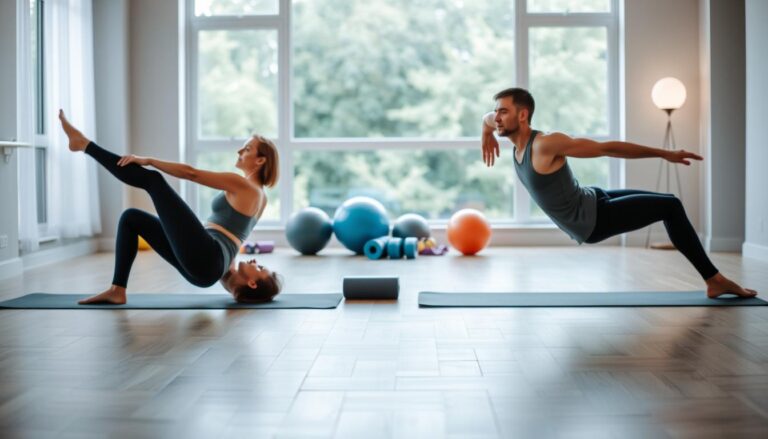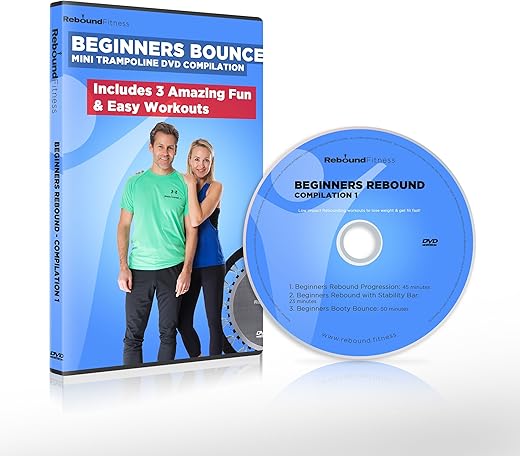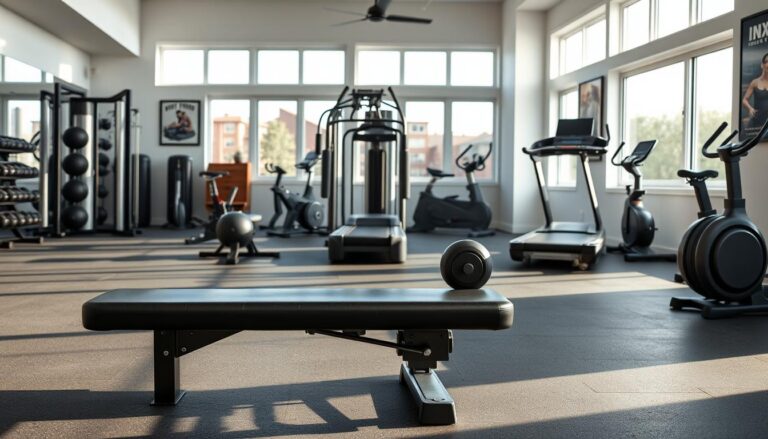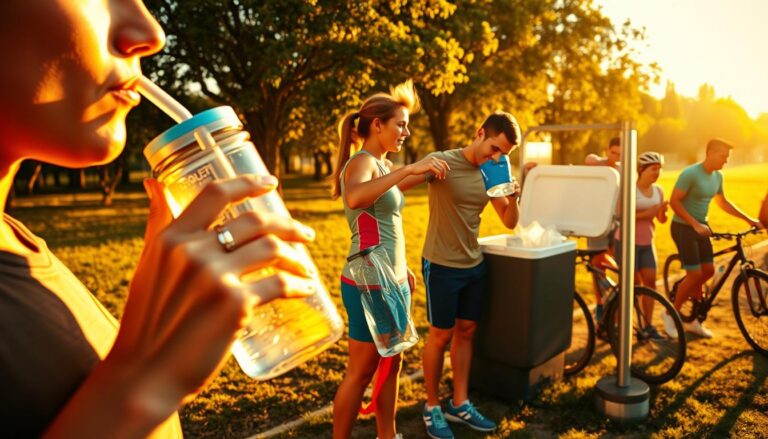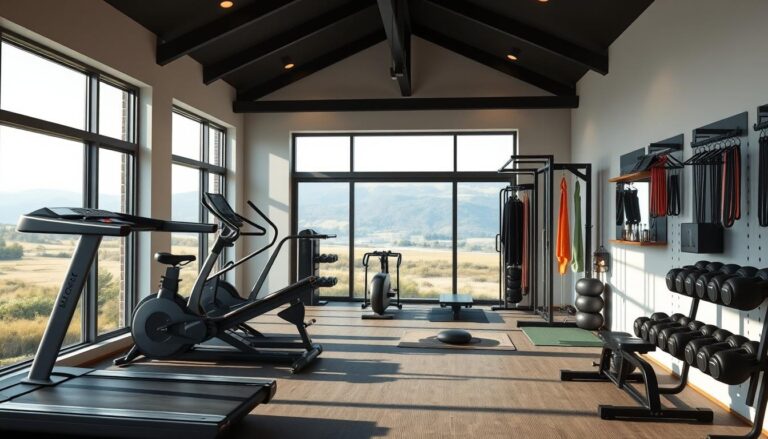How to Choose an Age-Friendly Personal Fitness Trainer
As people get older, their fitness needs change. It’s important to find a fitness trainer for seniors who knows these needs. The International Council on Active Aging (ICAA) says older adults have a wide range of abilities and needs.
Finding the right personal fitness trainer can be tough. A trainer with experience in working with seniors can make a safe and effective workout plan. They can address specific health concerns and goals.
Choosing the right trainer is key to reaching fitness goals and staying healthy. In this article, we’ll look at important factors to consider when picking a personal fitness trainer for older adults.
Key Takeaways
- Understanding the unique needs of older adults is crucial for effective fitness training.
- A trainer with experience working with seniors can create a safe and effective workout plan.
- Consider a trainer’s certifications and qualifications when making a selection.
- Assess a trainer’s ability to modify exercises for different abilities and needs.
- Choose a trainer who can help you achieve your specific fitness goals.
The Importance of Specialized Fitness Training for Seniors
As we age, our bodies change in ways that affect our daily lives. These changes make it harder to do everyday tasks and keep our independence. That’s why we need a special way to stay fit.
Age-Related Physical Changes and Exercise Needs
With age, we lose muscle, bone density, and flexibility. Our balance and coordination also change. Programs like NASM’s Senior Fitness Specialization address these issues. They focus on exercises that help seniors stay strong and balanced.
For example, resistance training can fight muscle loss. Balance exercises can lower the chance of falls. These are key for seniors.
| Physical Change | Exercise Need |
|---|---|
| Decline in Muscle Mass | Resistance Training |
| Reduced Bone Density | Weight-bearing Exercise |
| Impaired Balance | Balance Training |
Benefits of Working with a Specialized Senior Fitness Trainer
Having a senior fitness coach or elderly personal trainer is very beneficial. They know how to create safe and effective workout plans. These plans are tailored to each person’s health, fitness level, and goals.
They also teach the right way to do exercises. This helps prevent injuries. It’s all about staying safe and healthy while exercising.
“Exercise is a crucial component of healthy aging. A well-designed fitness program can help seniors maintain their physical function, reduce the risk of chronic diseases, and enhance their overall quality of life.”
Working with a specialized trainer can really help seniors. They can improve their physical abilities, reduce fall risks, and feel better overall. The trainer makes sure the workouts are right for each person, changing them as needed.
Understanding the Qualifications of a Senior Fitness Specialist
Choosing the right senior fitness instructor is key. A good one knows how to create safe, effective workouts for older adults. They have the skills and knowledge to meet these needs.
Essential Certifications for Senior Fitness Trainers
Certifications are very important for a senior fitness trainer. Two important ones are:
- ACE Senior Fitness Specialist: This shows they know how to make exercise plans for older adults.
- ACSM Exercise for Older Adults: This means they can create workouts that fit seniors’ special needs.
These certifications prove a trainer has learned how to work with older adults.
| Certification | Description | Issuing Organization |
|---|---|---|
| ACE Senior Fitness Specialist | Demonstrates expertise in creating exercise programs for older adults. | American Council on Exercise (ACE) |
| ACSM Exercise for Older Adults | Indicates a trainer’s ability to design exercise programs for seniors. | American College of Sports Medicine (ACSM) |
Experience Requirements to Look For
Experience is also crucial when picking a senior fitness trainer. Look for:
Years Working with Older Adults
A trainer with lots of experience with older adults knows how to handle aging challenges.
Testimonials from Senior Clients
What past clients say can tell you a lot about a trainer’s success with older adults.
Think about both certifications and experience to choose the best senior fitness instructor.
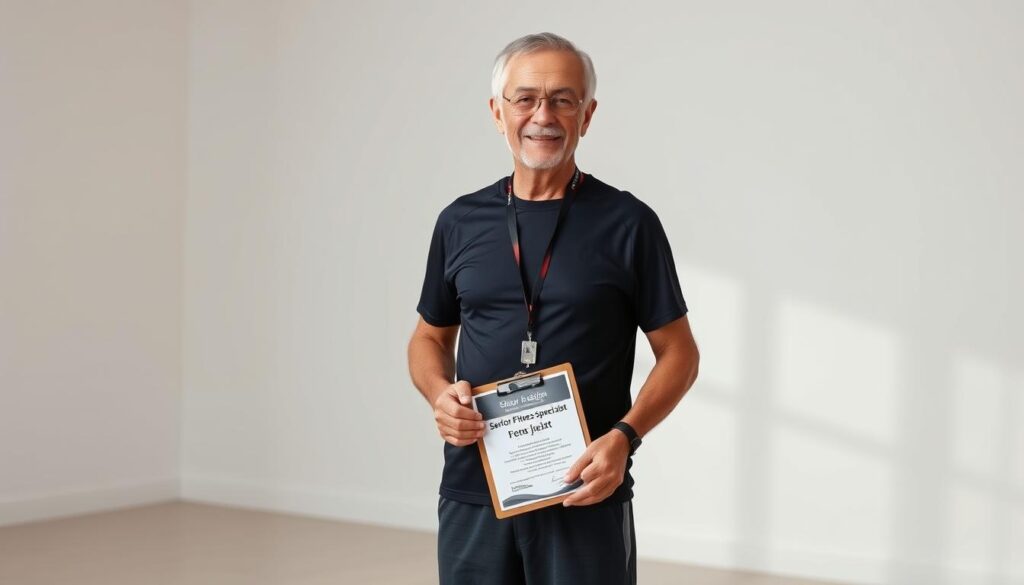
How to Choose an Age-Friendly Personal Fitness Trainer: Key Criteria
Finding the right personal fitness trainer is more than just looking at their credentials. It’s about finding someone who knows how to work with older adults. This means they need to understand the unique fitness needs of seniors.
Knowledge of Age-Appropriate Exercise Modifications
Choosing a trainer who knows how to adjust exercises for older adults is crucial. They should be able to tailor workouts to fit each person’s abilities. This ensures the exercises are safe and effective.
NASM’s curriculum teaches trainers to consider the physical limitations of older adults. This helps them create workout plans that meet these needs.
Understanding of Common Senior Health Conditions
Older adults often deal with health issues that affect their ability to exercise. A good trainer should know how to adapt workouts for these conditions.
Arthritis and Joint Issues
Trainers should know how to modify exercises for those with arthritis or joint problems. They should focus on low-impact activities that help with flexibility and strength without putting too much strain on the joints.
Cardiovascular Concerns
For seniors with heart issues, trainers need to create workouts that boost heart health without being too hard. This might include gentle aerobic exercises and keeping an eye on how intense the workout is.
Osteoporosis and Bone Health
It’s important for trainers to know how to safely work with seniors who have osteoporosis. They should focus on exercises that strengthen bones and avoid any that could cause fractures.
By looking for these key qualities, older adults can find a best fitness trainer for older adults. The right trainer will not only understand the physical needs of seniors but also adapt their teaching style to meet each person’s needs. This ensures a positive and effective fitness journey.
Assessing a Trainer’s Expertise in Senior-Specific Exercise Programs
When looking for a fitness trainer, it’s key to check their knowledge in senior exercise programs. This is important to make sure the training is safe and works well for seniors. It must meet their special needs and health issues.
Balance and Fall Prevention Training
A good senior fitness trainer knows how to prevent falls. They teach exercises that boost balance and lower fall risks. These exercises help keep seniors safe and independent.
For example, they might use single-leg stands, heel-to-toe walks, and balance poses. These help prevent injuries and keep seniors stable.
Strength Training for Bone Health
Strength training is vital for seniors to keep bones strong and prevent osteoporosis. A good program includes exercises that work many muscles. It’s tailored to the senior’s fitness and health.
Trainers might use resistance bands or light weights. This helps build muscle and strengthen bones.
Flexibility and Mobility Work
Flexibility and mobility exercises are key for seniors. They help keep joints moving and reduce stiffness. Trainers should use stretching and mobility drills that are easy on the joints.
These might include yoga or tai chi. They’re great for improving flexibility and balance.
To show why these exercises are important, here’s a table with key aspects of senior exercise programs:
| Exercise Component | Benefits | Examples |
|---|---|---|
| Balance and Fall Prevention | Reduces fall risk, improves stability | Single-leg stands, balance poses |
| Strength Training | Maintains bone density, improves muscle mass | Resistance bands, light weights |
| Flexibility and Mobility | Improves range of motion, reduces stiffness | Yoga, tai chi, stretching exercises |
For more info on senior exercise products, visit Fitness Gear Authority. They offer insights into the latest senior fitness products.
Communication Skills and Teaching Style Considerations
The success of a personalized exercise program for elderly people depends a lot on the trainer’s communication skills and teaching style. Good communication is key to a strong trainer-client relationship. This is especially true for seniors, who may have different physical abilities and learning styles.
Clear Instruction and Patience
A trainer who gives clear instructions and is patient is very important for seniors. Clear instructions help avoid confusion and make sure the client can follow along safely. Understanding how age affects quality of life and emotional well-being is also important, as a patient trainer can greatly improve the client’s exercise experience.
Ability to Adapt to Different Learning Styles
Seniors may learn in different ways, like visually, through sound, or by doing. A good trainer can change their teaching to fit the client’s learning style. This flexibility is crucial for making sure the client can do the exercises right.
Visual Demonstrations
Visual demonstrations are a great way to teach exercise techniques. By showing the right way to do an exercise, a trainer helps the client understand it better.
Verbal Cues and Feedback
Along with visual demonstrations, verbal cues and feedback are very important. They guide the client through their workout. Good feedback helps fix mistakes and keeps the client motivated to keep going.
| Teaching Method | Description | Benefit |
|---|---|---|
| Visual Demonstrations | Showing the correct form and execution of exercises | Enhances understanding and corrects form |
| Verbal Cues | Providing instructions and guidance during exercises | Helps in real-time correction and encouragement |
| Feedback | Offering constructive feedback on performance | Boosts confidence and improves technique |
Evaluating a Trainer’s Knowledge of Medical Considerations
Choosing a personal fitness trainer for seniors is important. It’s key to know if they understand medical issues related to exercise. A good trainer can create a safe and effective workout plan.
Understanding Medication Effects on Exercise is vital. Many seniors take medicines that can change how they exercise. For example, some meds can affect heart rate or balance. A good trainer knows this and adjusts the workout plan.
Understanding Medication Effects on Exercise
Medicines can change how the body reacts to exercise. For instance, beta-blockers can slow down the heart rate. A trainer who knows this can use other ways to check how hard someone is working out.
| Medication Type | Potential Exercise Limitation | Adaptation Strategy |
|---|---|---|
| Beta-blockers | Reduced heart rate response | Use RPE to gauge intensity |
| Blood Thinners | Increased risk of bruising | Avoid high-impact exercises |
| Diuretics | Dehydration risk | Ensure proper hydration |
Experience with Post-Rehabilitation Training
Many seniors have been through rehab after surgery or injury. A trainer with experience in post-rehab can help safely move from therapy to fitness. This helps in recovery and improves overall health.
Working with Physical Therapists
A trainer who works with physical therapists knows the value of teamwork. They can help continue the progress made in rehab. This ensures a smooth move to a fitness program that keeps improving health.
Progression from Therapy to Fitness
Being able to move a client’s workout from therapy to fitness is key. This not only helps in recovery but also in reaching fitness goals. It improves the quality of life for seniors.
By checking a trainer’s knowledge of medical issues, seniors and their families can make better choices. This ensures a safe, effective, and enjoyable fitness journey.
Practical Considerations When Selecting a Senior Fitness Coach
Choosing the right senior fitness coach is key. Several important factors need to be considered.
Location and Accessibility
The location of the fitness training is crucial. Seniors might prefer training at home or at a local gym.
Home-Based vs. Gym-Based Training
Training at home is convenient and comfortable. On the other hand, gym training offers access to more equipment. Some seniors might like both options.
Transportation and Facility Accessibility
For gym training, easy access to the facility is important. Easy access helps keep up with a workout routine.
Session Costs and Payment Options
The cost of sessions is a big factor. Seniors or their families should talk about payment structures. This includes package deals or insurance coverage.
- Compare prices among different trainers
- Inquire about discounts for long-term commitments
- Check if the trainer accepts insurance or offers financing options
Scheduling Flexibility
Scheduling flexibility is vital. It helps fit training into the senior’s lifestyle. Trainers with flexible scheduling ensure consistent workouts.
- Discuss preferred training times
- Understand the trainer’s policy on cancellations and rescheduling
- Plan a schedule that is realistic and maintainable
Red Flags to Watch For When Interviewing Potential Trainers
When interviewing potential trainers, watch out for red flags. These signs help you choose the right senior fitness instructor for you. Knowing these warning signs is key to making a good choice.
One-Size-Fits-All Approach
A trainer who doesn’t tailor workouts to each person might not be right for seniors. Seniors need plans that fit their health and abilities. Look for an elderly personal trainer who creates personalized plans for you.
Lack of Senior-Specific References
Ask for references from senior clients when interviewing trainers. No references from seniors might mean they lack experience with older adults. Check these references to make sure the trainer has a good track record with seniors.
Dismissive Attitude Toward Medical Concerns
Stay away from trainers who ignore your medical concerns or tell you to ignore pain. The International Council on Active Aging (ICAA) says this is dangerous. A good trainer respects your health and works with doctors to keep you safe.
Questions to Ask Before Hiring an Elderly Personal Trainer
Choosing the right fitness trainer for older adults is important. You need to ask the right questions to find the best fit for your senior’s needs.
Experience and Specialization Questions
It’s key to ask about a trainer’s experience with seniors. Some important questions are:
- What experience do you have in training seniors?
- Have you worked with clients with similar health conditions or fitness goals?
- Can you provide references or testimonials from previous senior clients?
Training Philosophy Questions
Understanding a trainer’s philosophy is crucial. It helps you see if their approach fits your senior’s needs. Ask:
- What is your training philosophy, and how do you tailor it for seniors?
- How do you assess a client’s fitness level and create a personalized plan?
- How do you ensure that your training methods are safe and effective for older adults?
Practical and Logistical Questions
Practical considerations are also important. Some questions to ask include:
- What are your availability and scheduling policies?
- How do you handle cancellations or make-up sessions?
- Do you offer any discounts or package deals?
Insurance and Liability Coverage
It’s crucial to ask about the trainer’s insurance and liability coverage. Ask:
- Do you have liability insurance that covers your clients during training sessions?
- What measures do you take to ensure client safety during workouts?
Cancellation and Make-up Session Policies
Understanding the trainer’s policies on cancellations and make-up sessions is important. Ask:
- What is your policy on session cancellations or rescheduling?
- How do you handle make-up sessions, and are they included in the initial package?
By asking these questions, seniors or their caregivers can make an informed decision. They can find a professional who is not only qualified but also a good fit for their specific needs.
| Category | Sample Questions |
|---|---|
| Experience and Specialization | What experience do you have with seniors? Can you provide references? |
| Training Philosophy | How do you tailor your training for seniors? How do you assess fitness levels? |
| Practical and Logistical | What are your scheduling policies? How do you handle cancellations? |
Conclusion: Making Your Final Decision
Choosing the right personal fitness trainer is key for a safe and effective workout, especially for seniors. As NASM points out, picking a qualified trainer is essential for reaching your fitness goals.
When looking for a senior-friendly workout instructor, check their qualifications, experience, and ability to tailor a program for elderly people. Make sure they know about age-related physical changes and can adjust their teaching to fit your needs.
To find a fitness trainer for seniors, look at their experience with senior-specific workouts. This includes balance and fall prevention, strength training for bones, and flexibility and mobility exercises. Also, consider their communication skills, knowledge of medical issues, and the location and cost of sessions.
By carefully thinking about these points, you can make a smart choice. You’ll find a trainer who meets your needs, helping you get a safe and effective workout plan.

